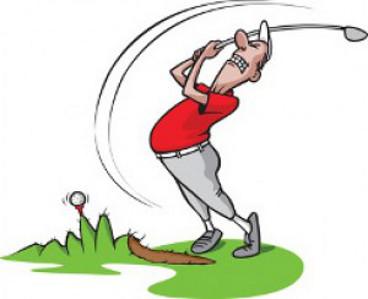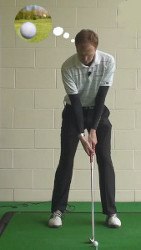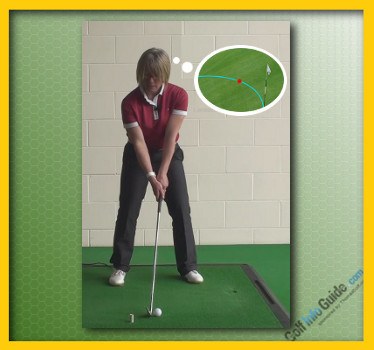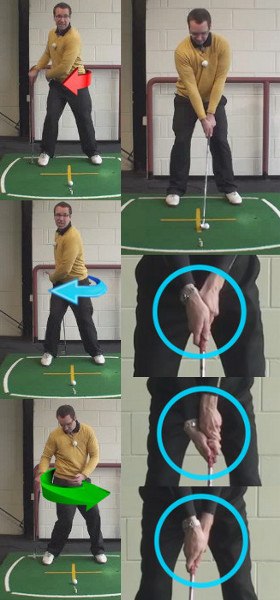
It happens to every golfer at one time or another: You're cruising along, playing pretty well, and next thing you know your swing has said adios.
You try to figure out what's gone wrong, dissecting various positions and focusing on your mechanics. Things only get worse from there.
How do you recover some semblance of a swing when everything's gone haywire? Stop thinking so much. For all its technical complexity, the golf swing boils down to one incredibly simple concept: See ball, hit ball. Keeping that thought, and only that thought, in mind is your best bet when all else fails. (Preferably, before all else fails.) Forget everything else, focus on the back of the ball, and hit it.
When your swing is less than finely tuned, it also helps to choose the least complicated shot option. Let's say you're between a 7-iron and 8-iron, needing to make a dialed-back swing with the 7 or go full tilt with the 8. What to do? Pick the 8 and swing with abandon. You might be surprised what happens when your mind is freed from all those mechanical details.

That's not to suggest you switch to “see ball, hit ball” mode at the first sign of trouble. By all means, search your mental database of personal swing keys when things go awry. Sometimes the solution is only a minor adjustment away, such as changing your ball position or slowing down the backswing. Other times, it's wise to accept that day's recurring mishit and use it to your advantage. For instance, if you find yourself fighting a slice, just go with it – aim left and get the ball in play.
But for those times when merely making decent contact becomes a battle, “see ball, hit ball” just might get you through the round.
Then work out those technical issues on the range so you're ready to roll next time.

Struggling on the Course? Simplify Your Thoughts
Golf is a complicated game. This is a point that can't really be argued, as anyone who has played even a single round knows just how much goes into trying to shoot a good score. With fourteen clubs in your bag and eighteen unique holes to navigate, there are endless combinations of ways in which you can attack a golf course. To the inexperienced, golf can be completely overwhelming simply due to the complicated nature of the game. In fact, even experienced players can find their minds spinning out on the course if they fail to have a solid game plan in place. It's great to hit nice shots on the driving range, but only players who can control their thoughts properly are going to be able to take that performance out onto the course.
You probably think of the biggest problems in your game as being things like the plane of your swing, your grip, or maybe even your equipment. However, for most people, the mental side of the game is actually the biggest hurdle in reaching lower scores. You have to think clearly in order to shoot good scores, as there are just so many potential distractions waiting between the first tee and the last green. Of course it will help to have great swing mechanics and quality equipment, but it is your mental game that has the potential to take you over the top.
Countless players all around the world complain about their inability to take the game they have on the driving range and translate it out onto the course. This isn't a complaint that is restricted to amateur players, either – professional golfers will struggle with the same difficulty from time to time as well. As you might suspect, the problems are going to be found between your ears when you have trouble swinging as well on the course as you do on the range. Hitting great shots on the range proves that you have the swing mechanics necessary to hit good shots, but you have to get your mind 'out of the way' when on the course. Some golfers are able to quickly work around this problem to get their game back on track, while others will struggle for a long period of time before they can start to shoot good scores once again.
In order to have your mental game supply you with the support you need on the course, you need to first accept just how important this part of golf is to your success. If you believe that the game is only about physical technique, you aren't going to be able to reach your potential. The best golfers in the world not only are able to make great swings, they also are able to think critically and control their emotions in order to perform well when it matters most. Dedicate yourself to improve your performance from a mental aspect and you can look forward to lower scores in the very near future.
All of the content below is based on a right handed golfer. If you happen to play left handed, please take a moment to reverse the directions as necessary.

Bad Thoughts
Before you can learn the correct way to think while on the golf course, we should first highlight the bad thoughts that many golfers have running through their heads. Golfers are well-known for getting in their own way from a mental standpoint, and you are probably guilty of some of the sins that are listed below. As you read through this list of bad thoughts, think about the last round of golf you played and pick out times when you were thinking in a way that likely hurt your performance.
- Thinking about the hazards. This is an extremely common problem. In fact, it is probably safe to say that every single golfer has been guilty of this sin at one point or another. Instead of looking at your intended target and thinking about the kind of swing you need to make to hit that target, you may find yourself thinking only about the hazards you need to avoid. For instance, if there is a large water hazard to the right of the green, your mind may be focused on making an 'anti-right' swing. The problem with this line of thinking is that it usually causes you to make a tentative, hesitant golf swing. Rather than swinging aggressively at the target you have picked, you will find yourself trying to guide the ball off of the club face.
- Playing to expectations. The power of expectation is an amazing thing. If you expect that you are going to succeed at something, you are far more likely to make that success a reality. At the same time, if you expect to fail, you very likely will fail in the end. This is true in golf just as it is true in many other areas of life. Many golfers look at the layout of a course prior to starting the round and decide in advance which holes are going to give them trouble. For example, a long par four or a hole which turns the opposite direction of your standard ball flight might be marked for trouble before you even get started. What chance do you have to succeed if you are already expecting to fail at parts of the round? Go into each round with a clean slate and believe that anything is possible on any given hole.
- Feeling peer pressure. Even when not playing in a competition, some golfers feel pressure just from other people watching them swing. This is commonly seen on the first tee, as many golfers have trouble hitting a good shot off of the first tee when other people are standing around. While this struggle might get better as the round goes on, some players are never able to get the thought of other people watching out of their mind. If this is a problem that plagues you on the course, remember that the other people watching you play are likely just as self-conscious about their games as you are about yours. Golf is a hard game, and everyone hits poor shots – including the best players in the world. Give every shot that you face your full effort and don't worry about what others may be thinking.
- Losing focus. It is easy to understand this point. After all, it is hard to maintain your focus for four hours or more while completing an 18 hole round. If you have a lapse in focus even for just a hole or two, you can quickly do damage to your scorecard. The trick to being able to maintain your focus over an entire round is to only focus when you really need to – and to let your mind wander as it will the rest of the time. It is unrealistic to focus all of your thinking on golf for the complete round, so the best way to go is to allow yourself to come 'in and out'. When you are getting ready to hit a shot, focus in on everything that you have to do to produce a quality shot. Then, while you are walking or driving between shots, feel free to think about other things or talk with others in your group.
- Trying too hard. The last point on our list is one that affects an incredible number of golfers. With the goal of shooting the best score possible for the round, many golfers end up trying too hard. That extra effort, unfortunately, will lead to more bogeys than birdies however. Golf is not an effort game, meaning you can't improve your performance just by trying harder. Rather, you have to simply execute your shots while maintaining an even level of effort throughout the day. Everyone wants to do their best on the course, but trying too hard is likely going to lead to higher scores rather than lower ones.
Mental mistakes are common in the game of golf. Whether those mistakes are in the form of poor club selection or simply thinking about the wrong things as with the points on the list above, you can easily lose strokes due to a faulty mental game.

Boiling It Down
Simplifying the mental game is perhaps the best way to cut the mental mistakes out of your game. It is true that golf is a complicated game, but that doesn't mean that you have to approach it in a complicated manner. In fact, it is usually the golfers who find a way to simplify the way they go around the course that are most successful in the end.
In reality, there are only a few basic things that you need to think about before hitting any shot. If you can simplify your thought process to the point where the following items are the only ones you think about before each shot, you will be in great shape from a mental game standpoint.
- Pick a club. Obviously, you are going to have to select a club for each shot that you hit. Use the yardage that you are facing, along with elevation change and any wind to decide on the right club for the shot.
- Pick a target. The target that you select needs to make sense for the club that you have in mind. For instance, if you are going to aim for the flag in the back corner of the green, you need to be holding a club that can reach that spot. On the other hand, if you are going for the middle of the green, you may be able to use one less club. You should always be as specific as possible when picking your target, and you should be fully committed to your choice before starting the swing.
- Pick a swing key. What is the key that you are going to focus on for the upcoming swing? Most players will have different swing keys depending on the club that they are holding, so make sure to focus your mind in on whatever key you think will lead to success. Picking a specific key will help you to execute properly because your mind won't be wandering around to a variety of different ideas while you stand over the ball.
With just those three points taken into consideration – club, target, swing key – you can be ready to hit a great shot. If you are regularly thinking about thinks that fall outside of this list, you need to work on revising the way your mind prepares for a golf shot. Once you find out just how powerful it can be to think the right way on the golf course, you will wonder why you did it the wrong way for so long.
Of course, as is the case with any physical change that you make in your golf swing, it is going to take some time for this mental change to become permanent. The best thing you can do to speed up this process is simply to practice it on the driving range. That's right – instead of standing there swinging away at shot after shot, you should be working through your mental routine one ball at a time. For each shot you hit, pick a target, pick a club, and focus in on a single swing key. Sure, it will take you longer to work through the bucket of balls that you are hitting, but you will be rewarded with a practice session that pays much bigger dividends for your game.

Remove Expectations
Lofty expectations are one of the biggest hurdles that golfers have to get over when they get out on the course. Most players expect to perform at their best when they hit the course, and then are disappointed when their performance falls somewhat short of that standard. Of course, you don't want to go out to the first tee expecting to play terrible, either – ideally, you will walk onto the tee with no expectations at all. By focusing in on only your process rather than the outcome, you can position yourself for consistent success.
The first thing you should do to help relax your mind prior to a round of golf is to forget about setting a 'target score' for the day. This is something that many golfers do, but it is completely counterproductive to quality golf. You don't want to set any expectations in this way because aiming for a specific score can place undo pressure on you early in the round. For instance, imagine that you have decided your target for the day is 79. On most courses, that means you can shoot 7 over par to hit your goal (par 72 courses). Therefore, if you make two or three bogeys early in the day, you may start to press, knowing that you can't afford to give away very many more shorts. On the other hand, if you have no specific scoring goal, you can 'keep your head down' and simply do your best on every shot. At the end of the round, you will add them all up and see how you did.
You also don't want to place any expectations on yourself in reference to other players in your group, or other players in a tournament. Unlike other sports, there is no defense that you can play in golf. If someone is going to light the course up and shoot a great score, there is simply nothing you can do about it. The only thing you control is your own performance, so place all of your effort and attention on the process of hitting good shots. When you think that way, much of the pressure will be removed from the situation and you will feel free to play your best.
The last piece of the expectation puzzle is the expectations that come from those around you. Again, you can't let the pressure that you feel from other people influence the way that you play. Most people don't mean any harm by their comments, but they can get in your head if you aren't careful. The classic way this takes place is when someone comments on the great round that you have going at the moment. They only mean it as a compliment, but you then start to think about how you don't want to mess up what you are doing through this point in the round. You are never going to be able to control what other people say, so your best bet on this point is to trust your routine and your focus to carry you through to the end of the round. As long as your attention remains centered on the next shot in front of you, the pressure of expectation should be kept at bay.

Play a Basic Round
If you are having trouble successfully getting your mind out of the way on the course, try playing a 'basic round' to teach yourself how to keep the game simple. What is a 'basic round'? Essentially, this is a round of golf where you hit the easiest, simplest shot possible throughout the entire day. On every approach shot, you aim for the middle of the green, regardless of where the pin is located. On tee shots, you play for the center of the fairway, and you don't try to cut any dogleg corners or go over any trees. Basically, you try to play an extremely boring round of golf from the first hole to the last.
So what is this kind of round going to do to help you play better normally? Well, for one thing, it will likely teach you that it is not necessary to take very many risks during the average round. When you are finished with the basic round, you might find that you actually scored better than you would have normally – or at least, you probably won't score any worse. Most amateur golfers regularly take on shots that are too difficult, and they pay the price in the way of penalty shots. If you learn how to make the safe and simple decision most of the time, you will become a better player in the long run.
Also, you should learn that you don't need to overcomplicate the game. Since you are opting for the easiest possible shot every single time, there are no hard decisions to make during your round. You will simply identify the easiest shot that is in front of you, go through your pre-shot routine, and make a swing. You will probably enjoy playing this way, as the stress of making tough decisions will be taken away. Even when you go back to playing a more aggressive style of golf, you should be able to benefit from learning how simple and streamlined your thought process can be.
Try to play this basic round on a day when you can play by yourself, or when you are playing with a good friend who will understand what you are trying to accomplish. If you would like, you could play several rounds in a row using this method to make a bigger impression on your mind before going back to your usual playing style. Hopefully, after you have completed one or more basic rounds of golf, you will be able to simplify your thinking for all rounds that you play going forward.
Your mind can be your greatest asset on the course – but it can also be your biggest enemy. If you allow the way you think on the course to get in the way of your performance, you will never be able to live up to your potential. Instead of letting your mind get in the way, try to streamline the way you think so that your mind can actually help you up your level of performance on a regular basis. With your mental game in line with your physical game, you should be able to look forward to greatly improved results.






